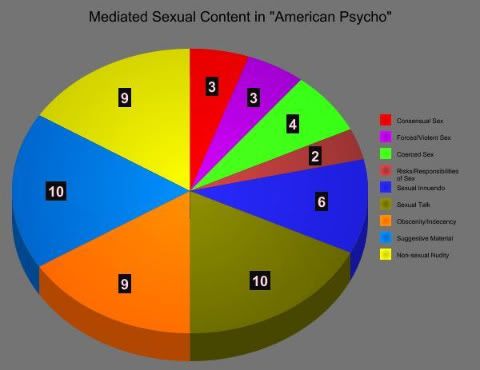In other words, does the material have serious literary, artistic, political and/or scientific value? My instinct defends the First Amendment, which has allowed a diversified population to grow and prosper within the US for many decades. But then, something strange happened.
I became an aunt of two beautiful children. Outside the classroom setting and into the parental setting, I found myself jumping for the remote when a romantic, slightly sexual scene happened upon the television accidentally. Perhaps the Parents Television Council
can explain my maternal instinct:
"In a recent Time Magazine Poll, 53 percent of respondents said that they think the FCC should place stricter controls on broadcast-channel shows depicting sex and violence. 68 percent believe the entertainment industry has lost touch with viewers' moral standards...Fifty percent said there is too much sexual content on TV. 49 percent say FCC regulation should be extended to cover basic cable." (Parents Television Council)
"American Psycho," a film with equal recognition internationally as well as nationally, won three awards and received nomination for six others. It's about a businessman turned serial killer who enjoys sexual violence so much that his prostitutes normally don't make it out alive.
With so many awards, YouTube views, and a 7.4-star IMDb rating to boot, the Parents Television Council facts may sound a bit contradictory. After all, if everyone damns sex and violence, why do films like "American Psycho" gross over $15 million dollars in revenue? (Source)
 |
| "American Psycho" content analysis of sexual material, compiled by Rebecca McKinnon |
Key
Red = 3 occurrences of consensual sex
Purple = 3 occurrences of forced/violent sex
Light Green = 4 occurrences of coerced sex
Maroon = 2 occurrences of the risks and responsibilities associated with sex
Dark Blue = 6 occurrences of sexual innuendo
Dark Green = 10 occurrences of sexual talk
Orange = 9 occurrences of obscenity/indecency
Light Blue = 10 occurrences of suggestive material
Yellow = 9 occurrences of non-sexual nudity
I expected this movie to include a lot of sex and violence, but I couldn't have imagined how many occurrences I recorded in its content analysis. I found myself pausing the movie during its point of commencement to comment on its use of aphrodisiac foods--mainly strawberries and raspberries--placed beside multiple roses, which can be seen as metaphors for virginity, sensuality and a woman's vagina. As I recorded acts of sex, I began to notice that many scenes included multiple categories one right after the other, perhaps suggesting that if my niece or nephew accidentally switched the channel at the right (or wrong?) time, they'd view multiple sexual occurrences before I had the chance to change the channel.
And unfortunately for the Parents Television Council, networks aren't hoping for regulation anytime soon. According to USA Today, viewers want to see the racier content, especially in popular dramas and comedies. And because the media is a business just like any other, it will join the competition no matter what it takes:
"'You need to get eyeballs. You need to be loud,' says Spike programming chief Kevin Kay, who is pairing 'Blue Mountain' with reruns of HBO's sex-centric 'Entourage.' 'Our viewers are experiencing content on other cable channels or the Web. Movies and video games are going after this audience, too.'"
In other words, because the media industry wants to make a couple bucks, it will show my nephew sexual material that might teach him it's okay to mistreat women. He's supposed to take care of his little sister and his future wife, but what if something like "American Psycho" changes his life forever? In the words of Charles Dickens: "Pause you who read this, and think for a moment of the long chain of iron or gold, of thorns or flowers, that would never have bound you, but for the formation of the first link on one memorable day."
According to socialization theory, he forms his social role very early in life, partly through media's instruction. If this role looks something like the main character's role in "American Psycho," I worry for his future. What if he viewed the sexual violence and became desensitized to it? Not only that, what if his inhibitions against harming women eventually disappeared? These are the scary thoughts that I'm sure fuel the reactions shared by the Parents Television Council.
But defenders of the First Amendment march on through these fears, arguing that sexual content isn't as detrimental as parents assume:
"Others, such as Fordham University media observer Paul Levinson, say TV merely mirrors life. 'It sounds radical, but this is healthy for popular culture,' Levinson says. 'Mainstream TV has been frozen in a very puritanical position by Congress, the FCC and the Supreme Court — all who don't seem to understand the First Amendment. Sex is part of life. If people are offended, there's a simple remedy: Don't watch.'" Source
Though I experience the same maternal fears the Parents Television Council shares in its survey information, my views still lean toward Levinson's. I love my niece and nephew enough to know what mediated messages are safe for them, and I should be diligent enough as a babysitter to prevent them from viewing such messages. The First Amendment not only protects our rights of free speech and free press, it also protects our capitalist economy--which runs smoothly without excessive, unnecessary regulation. If someone were to ask me whose hands my family belonged in, I would answer mine and my other family members', not the government's.